Fleurs du Mal Magazine


Or see the index
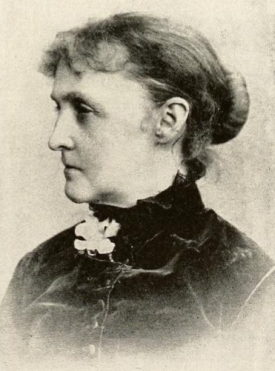
The Palace-Burner
A picture in a newspaper
She has been burning palaces. “To see
The sparks look pretty in the wind?” Well, yes—
And something more. But women brave as she
Leave much for cowards, such as I, to guess.
But this is old, so old that everything
Is ashes here—the woman and the rest.
Two years are—oh! so long. Now you may bring
Some newer pictures. You like this one best?
You wish that you had lived in Paris then?
You would have loved to burn a palace, too?
But they had guns in France, and Christian men
Shot wicked little Communists like you.
You would have burned the palace?—Just because
You did not live in it yourself! Oh! why
Have I not taught you to respect the laws?
You would have burned the palace—would not I?
Would I? Go to your play. Would I, indeed?
I? Does the boy not know my soul to be
Languid and worldly, with a dainty need
For light and music? Yet he questions me.
Can he have seen my soul more near than I?
Ah! in the dusk and distance sweet she seems,
With lips to kiss away a baby’s cry,
Hands fit for flowers, and eyes for tears and dreams.
Can he have seen my soul? And could she wear
Such utter life upon a dying face:
Such unappealing, beautiful despair:
Such garments— soon to be a shroud—with grace?
Has she a charm so calm that it could breathe
In damp, low places till some frightened hour;
Then start, like a fair, subtle snake, and wreathe
A stinging poison with shadowy power?
Would I burn palaces? The child has seen
In this fierce creature of the Commune here,
So bright with bitterness and so serene,
A being finer than my soul, I fear.
Sarah Morgan Bryan Piatt
1836–1919
The Palace-Burner
A picture in a newspaper
Poem
• fleursdumal.nl magazine
More in: # Classic Poetry Archive, #Editors Choice Archiv, Archive O-P, Archive O-P, Photography
Genesis P-Orridge, the mind and voice behind Psychic TV, Throbbing Gristle and COUM Transmissions, began their artistic journey in the 1960’s writing poetry.
Heartworm Press is proud to present hundreds of never before seen or published poems by this legendary, influential original.
Genesis P-Orridge, the mind and voice behind Psychic TV, Throbbing Gristle and COUM Transmissions, began their artistic journey in the 1960’s writing poetry.
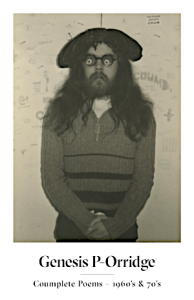 This collection introduces Genesis as a thoughtful innovator and irreverent provocateur with over two decades of poetry, from beat to concrete, and shows the progression of the self, beginning the book under the given name of Neil Megson and eventually growing into the enigmatic Genesis P-Orridge.
This collection introduces Genesis as a thoughtful innovator and irreverent provocateur with over two decades of poetry, from beat to concrete, and shows the progression of the self, beginning the book under the given name of Neil Megson and eventually growing into the enigmatic Genesis P-Orridge.
Heartworm Press is proud to present hundreds of never before seen or published poems including 50 images with an intro by friend and collaborator Wesley Eisold.
Genesis P-Orridge (1950 – 2020) was a singer-songwriter, musician, poet, performance artist, and occultist who rose to notability as the founder of the COUM Transmissions artistic collective and lead vocalist of seminal industrial band Throbbing Gristle. P-Orridge was also a founding member of Thee Temple ov Psychick Youth occult group, and fronted the experimental band Psychic TV.
Coumplete Poems – 1960’s & 70’s
by Genesis P-Orridge
Pub Date: 05/01/2023
Publisher: Heartworm Press
ISBN 979-8-9859385-2-4
SKU#: D19A
Binding: Paperback
Pages:212
Price: $ 28.00
• fleursdumal.nl magazine
More in: #Editors Choice Archiv, - Book News, - Bookstores, Archive O-P, Archive O-P, AUDIO, CINEMA, RADIO & TV, Performing arts
A self-proclaimed “vessel in which stories are told from time immemorial,” poet dg nanouk okpik seamlessly melds both traditional and contemporary narrative, setting her apart from her peers.
 The result is a collection of poems that are steeped in the perspective of an Inuit of the twenty-first century—a perspective that is fresh, vibrant, and rarely seen in contemporary poetics.
The result is a collection of poems that are steeped in the perspective of an Inuit of the twenty-first century—a perspective that is fresh, vibrant, and rarely seen in contemporary poetics.
Fearless in her craft, okpik brings an experimental, yet poignant, hybrid aesthetic to her first book, making it truly one of a kind.
“It takes all of us seeing, hearing, touching, tasting, and smelling to be one,” she says, embodying these words in her work.
Every sense is amplified as the poems, carefully arranged, pull the reader into their worlds. While each poem stands on its own, they flow together throughout the collection into a single cohesive body.
The book quickly sets up its own rhythms, moving the reader through interior and exterior landscapes, dark and light, and other spaces both ecological and spiritual.
These narrative, and often visionary, poems let the lives of animal species and the power of natural processes weave into the human psyche, and vice versa.
Okpik’s descriptive rhythms ground the reader in movement and music that transcend everyday logic and open up our hearts to the richness of meaning available in the interior and exterior worlds.
dg nanouk okpik is a resident advisor at Santa Fe Indian School in New Mexico. Her poetry appears in the books Effigies: An Anthology of New Indigenous Writing, and Sing: Poetry from the Indigenous Americas.
Corpse Whale
by dg nanouk okpik
Publisher: University of Arizona Press
Series: Sun Tracks
Publication Date: October 11th, 2012
Language: English
Paperback
Pages: 112
ISBN: 9780816526741
ISBN-10: 0816526745
$16.95
• fleursdumal.nl magazine
More in: - Book News, - Bookstores, Archive O-P, Archive O-P, Natural history
The extraordinary true story of the Stasi’s poetry club: Stasiland
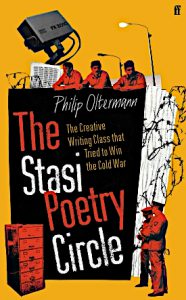 East Germany’s secret police were convinced that writers were embedding messages in their work.
East Germany’s secret police were convinced that writers were embedding messages in their work.
This reveals how soldiers had monthly meetings to learn how to write lyrical verse, weaponising poetry in the struggle against the class enemy.
A literary detective story with spies who were moulded into poets; poets who spied on fellow writers.
Philip Oltermann grew up in Schleswig-Holstein and studied English and German literature at Oxford University and University College London.
As a journalist he has written for Granta, the LRB and the Guardian, for whom he is the Berlin Bureau Chief.
The Stasi Poetry Circle (Hardback)
Philip Oltermann
Publ: Faber & Faber
Date Published 17.02.2022
ISBN: 9780571331192
Hardcover
Price £14.99
• fleursdumal.nl magazine
More in: #Editors Choice Archiv, - Book News, - Bookstores, Archive O-P, Archive O-P, REPRESSION OF WRITERS, JOURNALISTS & ARTISTS

Avondgeluiden
Er moeten witte hoeven achter de zoom staan
van de blauwe velden langs de maan
‘s avonds hoort gij aan de verre steenwegen
paardehoeven
dan hoort gij alles stille waan
van verre maanfonteinen zijpelt plots water
– gij hoort plots het zijpelen
van avondlik water –
de paarden drinken haastig
en hinniken
dan hoort men weer hun draven stalwaarts
.
Paul van Ostaijen
(1896 – 1928)
Avondgeluiden
• fleursdumal.nl magazine
More in: Archive O-P, Archive O-P, Expressionism, Expressionisme, Ostaijen, Paul van, Paul van Ostaijen, Paul van Ostaijen
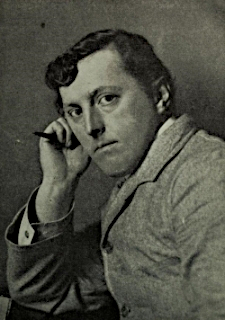
To a Lost Love
I cannot look upon thy grave,
Though there the rose is sweet:
Better to hear the long wave wash
These wastes about my feet!
Shall I take comfort? Dost thou live
A spirit, though afar,
With a deep hush about thee, like
The stillness round a star?
Oh, thou art cold! In that high sphere
Thou art a thing apart,
Losing in saner happiness
This madness of the heart.
And yet, at times, thou still shalt feel
A passing breath, a pain;
Disturb’d, as though a door in heaven
Had oped and closed again.
And thou shalt shiver, while the hymns,
The solemn hymns, shall cease;
A moment half remember me:
Then turn away to peace.
But oh, for evermore thy look,
Thy laugh, thy charm, thy tone,
Thy sweet and wayward earthliness,
Dear trivial things, are gone!
Therefore I look not on thy grave,
Though there the rose is sweet;
But rather hear the loud wave wash
These wastes about my feet.
Stephen Phillips
(1864 – 1915)
To a Lost Love
• fleursdumal.nl magazine
More in: #Editors Choice Archiv, Archive O-P, Archive O-P
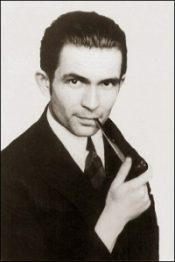
Melopee
Voor Gaston Burssens
Onder de maan schuift de lange rivier
Over de lange rivier schuift moede de maan
Onder de maan op de lange rivier schuift de kano naar zee
Langs het hoogriet
langs de laagwei
schuift de kano naar zee
schuift met de schuivende maan de kano naar zee
Zo zijn ze gezellen naar zee de kano de maan en de man
Waarom schuiven de maan en de man getweeën gedwee naar de zee
.
Paul van Ostaijen
(1896 – 1928)
Melopee
• fleursdumal.nl magazine
More in: Archive O-P, Archive O-P, Expressionism, Expressionisme, Ostaijen, Paul van, Paul van Ostaijen, Paul van Ostaijen

Sometimes In The Middle Autumn Days
Sometimes in the middle autumn days,
The windless days when the swallows have flown,
And the sere elms brood in the mist,
Each tree a being, rapt, alone,
I know, not as in barren thought,
But wordlessly, as the bones know,
What quenching of my brain, what numbness,
Wait in the dark grave where I go.
And I see the people thronging the street,
The death-marked people, they and I
Goalless, rootless, like leaves drifting,
Blind to the earth and to the sky;
Nothing believing, nothing loving,
Not in joy nor in pain, not heeding the stream
Of precious life that flows within us,
But fighting, toiling as in a dream.
O you who pass, halt and remember
What tyrant holds your life in bond;
Remember the fixed, reprieveless hour,
The crushing stroke, the dark beyond.
And let us now, as men condemned,
In peace and thrift of time stand still
To learn our world while yet we may,
And shape our souls, however ill;
And we will live, hand, eye and brain,
Piously, outwardly, ever-aware,
Till all our hours burn clear and brave
Like candle flames in windless air;
So shall we in the rout of life
Some thought, some faith, some meaning save,
And speak it once before we go
In silence to the silent grave.
George Orwell
(1903 – 1950)
Sometimes In The Middle Autumn Days
First published by The Adelphi, March 1933
• fleursdumal.nl magazine
More in: 4SEASONS#Autumn, Archive O-P, Archive O-P, George Orwell, Orwell, George

Een schoon gezicht . . .
Een schoon gezicht heeft de dagblad-postiche
CREME LA NYMPHE
zij zou zeer schoon zijn indien
zij geen sproeten had
Hoe jammer wanneer een zo schone vrouw sproeten heeft
zomersproeten
zoals bij deze postiche het geval is
gebekt haar
de boog van de wenkbrauwen
en de lieve mond
en de volle wangen
en de kuiltjes
doch zoals gezegd
hoe jammer die zomersproeten
Nochtans heb je
CREME LA NYMPHE
hoofdapoteek bijhuizen overal verkrijgbaar
het jammer kan worden verwijderd
dank zij de hoofdapoteek en de bijhuizen
zijn er op de wereld geen sproeten meer
en u
allerschoonste met gekruld haar en verlokkelike lippen
u
die prijkt op de laatste bladzijde
van het laatste nieuws
kan ik beminnen
omdat gij dank de nimfezalf
voortaan zult zijn
zonder sproeten
of zomersproeten
Paul van Ostaijen
(1896 – 1928)
Een schoon gezicht . . .
• fleursdumal.nl magazine
More in: Archive O-P, Archive O-P, Expressionism, Expressionisme, Ostaijen, Paul van, Paul van Ostaijen
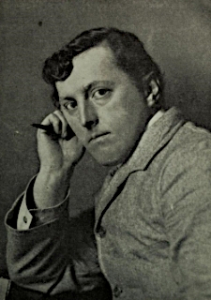
Poems
No Muse will I invoke; for she is fled!
Lo! where she sits, breathing, yet all but dead.
She loved the heavens of old, she thought them fair;
And dream’d of Gods in Tempe’s golden air.
For her the wind had voice, the sea its cry;
She deem’d heroic Greece could never die.
Breathless was she, to think what nymphs might play
In clear green depths, deep-shaded from the day;
She thought the dim and inarticulate god
Was beautiful, nor knew she man a sod;
But hoped what seem’d might not be all untrue,
And feared to look beyond the eternal blue.
But now the heavens are bared of dreams divine.
Still murmurs she, like Autumn, ´This was mine!’
How should she face the ghastly, jarring Truth,
That questions all, and tramples without ruth?
And still she clings to Ida of her dreams,
And sobs, ´Ah! let the world be what it seems!’
Then the shy nymph shall softly come again;
The world, once more, make music for her pain.
For, sitting in the dim and ghostly night,
She fain would stay the strong approach of light;
While later bards cleave to her, and believe
That in her sorrow she can still conceive!
Oh, let her dream; still lovely is her sigh;
Oh, rouse her not, or she shall surely die.
Stephen Phillips
(1864 – 1915)
Poems
• fleursdumal.nl magazine
More in: #Editors Choice Archiv, Archive O-P, Archive O-P
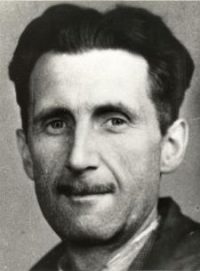
The Italian Soldier
Shook My Hand
The Italian soldier shook my hand
Beside the guard-room table;
The strong hand and the subtle hand
Whose palms are only able
To meet within the sounds of guns,
But oh! what peace I knew then
In gazing on his battered face
Purer than any woman’s!
For the flyblown words that make me spew
Still in his ears were holy,
And he was born knowing that I had learned
Out of books and slowly.
The treacherous guns had told their tale
And we both had bought it,
But my gold brick was made of gold –
Oh! who ever would have thought it?
Good luck go with you, Italian soldier!
But luck is not for the brave;
What would the world give back to you?
Always less than you gave.
Between the shadow and the ghost,
Between the white and the red,
Between the bullet and the lie,
Where would hide your head?
For where is Manuel Gonzalez,
And where is Pedro Aguilar,
And where is Ramon Fenellosa?
The earthworms know where they are.
Your name and your deeds were forgotten
Before your bones were dry,
And the lie that slew you is buried
Under a deeper lie;
But the thing that I saw in your face
No power can disinherit:
No bomb that ever burst
Shatters the crystal spirit.
George Orwell
(1903 – 1950)
The Italian Soldier Shook My Hand
• fleursdumal.nl magazine
Taken from ‘Looking Back on the Spanish War’, published by New Road, 1943. Poem written 1939
More in: Archive O-P, Archive O-P, George Orwell, Orwell, George

Orestes
Me in far lands did Justice call, cold queen
Among the dead, who after heat and haste
At length have leisure for her steadfast voice,
That gathers peace from the great deeps of hell.
She call’d me, saying: ‘I heard a cry by night!
Go thou, and question not; within thy halls
My will awaits fulfilment. Lo, the dead
Cries out before me in the under-world.
Seek not to justify thyself: in me
Be strong, and I will show thee wise in time;
For, though my face be dark, yet unto those
Who truly follow me through storm or shine,
For these the veil shall fall, and they shall see
They walked with Wisdom, though they knew her not.’
So sped I home; and from the under-world
Forever came a wind that fill’d my sails,
Cold, like a spirit! and ever her still voice
Spoke over shoreless seas and fathomless deeps,
And in great calms, as from a colder world;
Nor slack’d I sail by day, nor yet when night
Fell on my running keel, and now would burn,
With all her eyes, my errand into me.
So sped I on, fill’d with a voice divine:
And hardly wist I whom I was to slay,
My mother! but a vague, heroic dream
Possess’d me; fired to do the will of gods,
I lost the man in minister of Heaven;
Nor took I note of sandbank, nor of storm,
Nor of the ocean’s thunders, when the shores
All round had faded, leaving me alone:
I knew I could not die, till I had slain!
But, when I came once more upon the land
That rear’d me, all the sweetness of old days
Came back on me: I stood, as from a dream
Waked to a sudden, sad reality.
And when, far off, I saw those ancient towers,
The palaces and places of my youth,
I long’d to fall into my mother’s arms,
And tell a thousand tales of near escapes.
And lo! the nurse, that fondled me of yore,
Fell with glad tears upon my neck, and told
How she, and how my mother, all this while
Had dream’d of all I was to do, and said
How dear I should be to my mother’s eyes.
Her words shook me, but shook not my resolve.
For even then there came that sterner voice,
Echoing to what was highest in the soul.
Then, like to those who have a work on earth,
And put far from them lips of wife or child,
And gird them to the accomplishment; so I
Strode in, nor saw at all mine ancient halls;
And struck my father’s murderess, not my mother.
And, when I had smitten, lo, the strength of gods
Pass’d from me, and the old, familiar halls
Reel’d back on me; dim statues, that of old
Holding my mother’s hand I marvell’d at,
And questioned her of each. And she lies there,
My mother! ay, my mother now; O hair
That once I play’d with in these halls! O eyes
That for a moment knew me as I came,
And lighten’d up, and trembled into love;
The next were darkened by my hand! Ah me!
Ye will not look upon me in that world.
Yet thou, perchance, art happier, if thou go’st
Into some land of wind and drifting leaves,
To sleep without a star; but as for me,
Hell hungers, and the restless Furies wait.
Then the dark Curse, that sits upon the towers,
Bow’d down her awful head, thus satisfied,
And I fled forth, a murderer, through the world.
Stephen Phillips
(1864 – 1915)
Orestes
• fleursdumal.nl magazine
More in: #Editors Choice Archiv, Archive O-P, Archive O-P
Thank you for reading Fleurs du Mal - magazine for art & literature